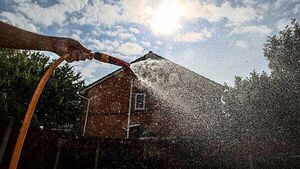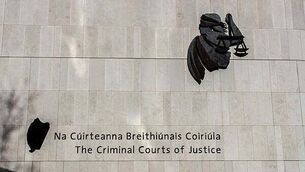Seven counties under a hosepipe ban: What does it mean?

Eva Osborne
Counties Cork, Waterford, Tipperary, and Wexford will be placed under a Water Conservation Order, commonly referred to as a hosepipe ban, by Uisce Éireann.
This ban comes into effect for the four counties (excluding Cork City) from Saturday. The orders will be in effect for seven and a half weeks, until September 16th.
These are in addition to the three existing Water Conservation Orders, which remain in place for Mullingar, Co Westmeath; Milford, Co Donegal; and Kells-Oldcastle, Co Meath.
The hosepipe ban in these three counties will remain in place until August 4th after being extended.
But what is a hosepipe ban, why are they needed, and what steps should you take to conserve water?
Hosepipe ban
A hosepipe ban prohibits the use of garden hosepipes and other non-essential uses of water by domestic users and commercial premises for non-commercial activities, for example watering gardens attached to a business premises.
Uisce Éireann is appealing to all customers, regardless of whether their supply is affected by a hosepipe ban, to be mindful of their water usage, as a significant number of supplies around the country remain under pressure.
Uisce Éireann said the hosepipe ban has been issued in a bid to safeguard these water supplies for essential purposes following a sharp increase in demand across the affected counties.
"This has put increased pressure on rivers and other water sources supplying these areas, many of which are at historically low levels following a drier than normal autumn, winter and spring.
"In recent weeks, Uisce Éireann has been putting in place a number of measures to maintain and protect these supplies, including enhanced leakage repair works, tankering to reservoirs, pressure management and public water conservation campaigns in an effort to reduce demand to sustainable levels."
Asset strategy manager with Uisce Éireann, Mairead Conlon, said the past 12 months have been drier than normal when compared to the long-term average.
While recent rainfall has brought some respite, it will take much longer for all supplies to recover, she said.
"The situation is compounded by recent increased demand in the South of the country which is associated with warm weather, and other factors such as tourist activity in some areas. As a result we have almost 50 supplies which are currently in drought status.
"This includes many supplies across counties Waterford, Tipperary, Wexford and Cork County in particular, in addition to the three supplies for which Water Conservation Orders were issued earlier this year and remain in place, namely Mullingar, Co Westmeath; Milford, Co Donegal; and Kells-Oldcastle, Co Meath."
Key messages and tips
Conlon said Uisce Éireann is reminding all customers to be mindful of their use of water so that supplies can be protected, especially in areas where water resources are under pressure.
She highlighted that using a hosepipe for one hour is the equivalent of the daily water usage of an average family and this is generally a non-essential use of water.
“There are lots of helpful tips for conserving water on water.ie but the key messages are to leave the hose and the pressure washer in the shed; reuse household water for the garden; and take shorter showers."
Uisce Éireann water-saving tips:
- Leave the hose in the shed: Drop the hose during the summer months. Use a rose head watering can to water your plants instead of a hose or sprinkler. Running a hose for just one hour uses as much water as a family would typically need in an entire day;
- Bucket and sponge for your car: Using a bucket and sponge to wash your car can save hundreds of litres of water compared to using a hose or power washer;
- Turn off the tap: Brushing your teeth with the tap running wastes up to six litres of water per minute. Turning it off while brushing can reduce that to just one litre;
- Switch to a shower: Showers use about half the amount of water as baths. Invest in water saving appliances such as water efficient taps and shower heads;
- Shorter showers: With the average shower using seven litres of water per minute by turning your five-minute shower into four minutes, you could save up to seven litres of water per day;
- Fully load your appliances: Always ensure your dishwasher and washing machine are fully loaded before use. A typical washing machine uses approximately 65 litres of water, and a dishwasher uses around 20 litres per cycle. By ensuring they are fully loaded, not only will you conserve water, but you will also reduce your energy bills.





